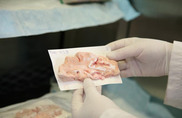2005-07-26
Moms, want to lower stress? Try breastfeeding. New research from the Douglas Hospital Research Centre shows mothers who breastfeed respond less to stressful situations than those who bottle-feed their children. These findings suggest these mothers may be better able to care for their children.
“It has been well established that breast milk is the best source of nutrition for infants - it is beneficial to their physical and mental development,” says Claire-Dominique Walker PhD, senior investigator and director of the Neuroscience Research Division at the Douglas Hospital Research Centre. “Our work now shows that there is a reciprocal benefit of breastfeeding to the mothers– they react less to stressful situations. This means they will focus more on their children and have more energy for activities such as attending to their infants and producing milk – this is an obvious gain for the children.”
Walker and her team, including Sonia J. Lupien, PhD, director of the Douglas’ Centre for Studies on Human Stress and graduate student Mai Tu, studied the stress responses of 25 breastfeeding and 25 bottle-feeding mothers, having either one baby or several other children. The moms were exposed to different types of stressful situations ranging from those considered “emotional or relevant” – watching a video about hurt and lost children, to those considered “non-threatening or non-relevant” – such as public speaking and math problems. Stress was determined by measuring the levels of cortisol (a stress hormone) in their saliva. The preliminary findings show that the breastfeeding moms had reduced levels of cortisol (indicating less stress) during the emotional and non-threatening stress situations. This effect also occurred in response to the relevant stressor, but it was even more pronounced in experienced breastfeeding mothers (i.e. mothers with several children). This indicates an added potential benefit of breastfeeding after repeated deliveries.”
“This difference in response to relevant and non-relevant stressors is very interesting,” says Tu. “It means that the experienced breastfeeding moms filter out the important stressor from the insignificant one and that bottle-feeding mothers might be less able to do so. Our findings show some of the bottle-feeding moms to be more reactive to stress, which may lead to less than optimal care for the infant.”
“Our study may also have implications for women prone to post-partum depression,” adds Walker. “Post-partum stress is a risk factor for post-partum depression. If we can better understand how the breastfeeding moms reduce their stress, by filtering daily life challenges we may be able to better treat the moms prone to post-partum depression.”
Information
Florence Meney
Media Relation
Communications and public affairs
Phone: 514-761-6131, ext. 2769
Cell.: 514-835-3236
florence.meney@douglas.mcgill.ca














